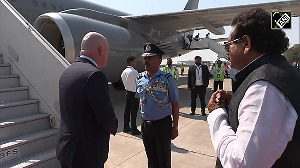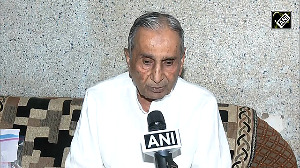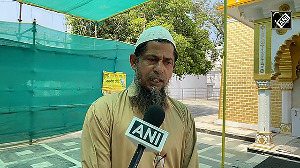The Bharatiya Janaat Party's 'lotus' bloomed for the first time in south India in 2008 but the saffron party had little time to celebrate as Karnataka was rocked by serial bomb blasts in capital Bangalore and attacks on churches that drew flak in the country and abroad.
But the state saw history being made when the scientists of Bangalore-based Indian Space Research Organisation successfully launched the country's first unmanned moon mission --Chandrayaan-1 on October 22 from Sriharikota.
Karnataka, which witnessed political instability after the 2004 Assembly elections threw up a fractured verdict and ultimately led to collapse of three coalition governments, turned a new leaf with the people voting into office the
BJP government led by B S Yeddyurappa.
The assuming of office by Yeddyurappa realised the saffron party's dream of making Karnataka its gateway to the
South. The elections saw the rejection of Congress which was hoping to make a comeback and Deve Gowda's Janata Dal-Secular biting the dust.
The BJP fell three seats short of majority. However, JD-S lost four of its MLAs and the Congress three and the
legislators, who wrote a new chapter circumventing the anti-defection laws, will face the electorate in the December
27 by-elections.
Even as the counting of votes for the assembly polls were underway on May 25, a massive hooch tragedy struck the
state claiming more than 130 lives in Bangalore, neighbouring Kolar and Hoskote.
As the new government was finding its feet, Bangalore was rocked by serial bomb blasts on July 25, which left two
dead and more than six people injured.
The year also saw Kannada getting the classical language status along with Telugu, four years after Tamil were accorded the same honour.
Karnataka hit national and international headlines when some churches and Christian institutes were targeted by
some persons, suspected to be Bajrang Dal activists during September.
The BJP government had to face attacks from opposition and also a threat by the Centre to initiate action against it if it failed to check the incidents.
The Centre issued two advisories to the BJP Government asking it to take immediate action to halt the attacks against properties of minority communities and ensure their protection.
Earlier, the state prepared itself for elections, a fresh water row erupted between Karnataka and Tamil Nadu over the Hogenakkal water project. The row started when the then BJP's Chief Ministerial candidate Yeddyurappa visited Hogenakkal in Tamil Nadu and claimed that the place belonged to Karnataka. He opposed the water project being implemented by Tamil Nadu that envisages providing drinking water to two water-starved districts of Krishnagiri and Dharmapuri.
Tensions ran high in both the states as properties belonging to Tamils were targeted in Karnataka and some commercial establishments owned by Kannadigas were damaged in Tamil Nadu.
Heeding to demands from various quarters in Karnataka, Tamil Nadu Chief Minister M Karunanidhi put the project on hold till a popular government was installed in the neighbouring state. But, after the BJP Government came to power it continued its opposition to the project and asked the Centre to convene a meeting of the Chief Ministers of both the states to sort out the issue.
The year also saw JD-S being isolated in the state after the Congress refused to have a tie-up with the party to
contest the by-polls. The JD-S is part of the third front at the national level, which the Left and other parties are trying to project as an alternative to the Congress and BJP.
Senior Congress leader S M Krishna resigned as Maharashtra Governor two months before the Assembly polls to
lead the party in the elections, but the party lost. After the party failed to get majority in the 2004 Assembly elections, Krishna was made Maharashtra Governor, but the tech-savvy leader was openly airing his views about returning to active politics.
A special court convicted 10 activists of the banned Deendar Chennabasaveswara Anjuman sect to death sentence and 12 others to life imprisonment in connection with the 2000 serial bomb blasts in churches.
The year also saw the commissioning of the newly built Bengaluru International Airport and shutting down of the HAL airport.






 © 2025
© 2025